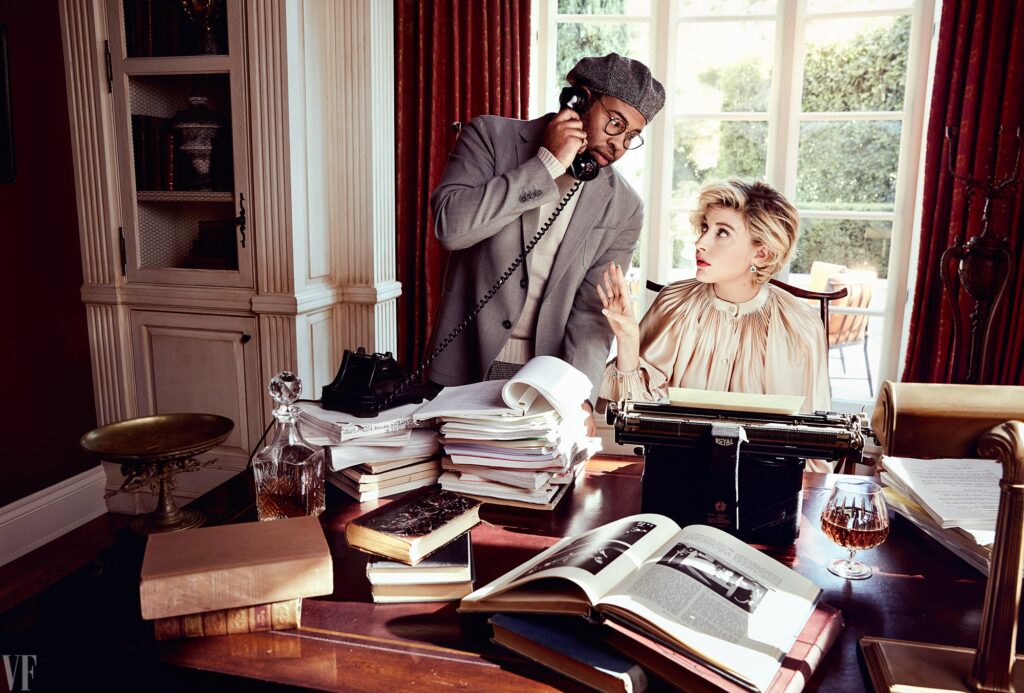
As the New Year rang in, I went back through many of my old articles and I was surprised at the extent of the minutia I covered. If you were someone just getting into screenwriting and you stumbled across this site, you may think this craft was so overwhelming, why even bother?
To be fair, mastering any skill is a long involved journey. And there’s value to obsessively mastering every little crevice of this skill in an attempt to write the best screenplay possible.
With that said, details can consume you, and ultimately sabotage you, if you become obsessed with them to the extent that you overlook the basic principles of good screenwriting. Let me provide you with an analogy.
There’s this principle in tennis that’s come up in the last five years called “wrist lag.” The idea is, when you’re hitting your forehand, you want your wrist laid back and dragging as you swing the racket forward. Then, at the last second, just before you hit the ball, you want to whip your wrist through, which allows you to get more power.

Now, is wrist lag important? Sure. But wrist lag makes no difference at all if you haven’t gotten to the ball on time, if you haven’t set your feet properly, if you haven’t gotten your racket back early, if you haven’t timed the swing properly, if you haven’t extended out through the ball.
Ironically, one’s obsession with wrist lag will actually make the forehand worse than if they’d never attempted it in the first place. That’s because focusing on highly specific details meant to take your script – er, I mean your forehand – to the next level, are pointless if the basics aren’t in place.
Another more universal analogy might be someone focusing on intermittent fasting to lose weight when they can’t even make it through the week without late-night binging on In and Out and donuts for three of those days. Totally not talking about myself here.
You get the point. You need to learn how to control basic calorie consumption before you go off and try some highly specialized eating system meant for finely-tuned athletes who are looking to go from 9% body fat to 8%.
So today’s post is a reminder of the eight primary things that will have the biggest impact on the quality of your script. If you’re weak in any of these areas, I’d advise you to work on improving them before you go off and work on things like perspective-based dramatic irony. Or even simple stuff, like obsessing over which to use, bolded or un-bolded slug lines.
The basics may be boring. But they will be the primary reason for whether your script is good or bad. So let’s remind ourselves of them.
A larger than life movie idea with high stakes – I often think about terms such as “high concept” and “a great hook,” and while I believe these things are important, the reality is, most movies aren’t high concept. They don’t have buzzy hooks, like “Nope,” or “65.” And that’s because not everybody likes to write genre horror or genre sci-fi. But that doesn’t mean you can just write anything you want and expect the reader to care. There has to be somewhat of an elevated feel to your idea. Which is why I say, write something that feels larger than life. Instead of writing a group of friends reuniting at a cabin, write Knives Out (a group of people at a house and someone is murdered). Instead of writing about a loner who feels disconnected from the world, write about a loner who feels disconnected from the world who finds his calling in “nightcrawling,” the art of public citizens racing to cover violent late-night news stories. You want your mind thinking along those lines.
Outline – I’m not going to get into a big debate on outlining. I’ll leave that up to you. But I’ll remind everyone that the main reason writers lose their way when writing a script is that they didn’t plot their story out ahead of time, and therefore, ran out of ideas. “To plot” literally means “make plans to carry out.” So why would you expect to do anything successfully without making plans ahead of time? Outlining creates a blueprint for your script which makes it way easier to get to the end. That’s valuable in an art form where you quickly learn how far off page 100 feels when all you’ve got is a cool idea and a vague understanding of your main character.
A strong main character – If you took the plot away from your story and all we did was follow your main character around, would we want to keep following them or would we quickly grow bored of them? The main thing you’re trying to do with your character-construction is create someone memorable. That “memorability” can come from being eccentric (Louis Bloom), really funny (Deadpool), larger than life (Tony Stark), insanely active (John Wick), highly opinionated (Travis Bickle), really messed up (Carrey Mulligan in Promising Young Woman). What you’re trying to avoid is a character who’s casual, normal, passive, reactive, someone you’d never notice in a crowd. These characters kill screenplays, man. I realize that some movies require softer main characters. But there has to be some larger-than-life aspect to your main character if your screenplay is to have any chance.
A first act that grabs us – It’s been said in a million and one screenwriting books. And yet, I’d say a good 70% of the scripts I read continue to make the mistake of writing a first act that doesn’t grab the reader. Or only kind of grabs the reader (which is just as bad, by the way). Treat your first act like it’s a life-or-death situation. I’m not talking about for your characters. I’m talking about FOR YOU. Write like you will immediately die if the reader puts your script down before finishing the first act. I’m serious! Because if you don’t treat that first act like a life or death situation, I guarantee you other writers who respect the ease in which a reader gets bored are writing better first acts than you. From the first line to the the last line in that first act, give us something we can’t put down. And if your response is, my script isn’t that kind of script? Well then maybe you should be writing a different script.
A second act that moves – Remember what the second act is. It’s the “conflict” act. All that means is you’re going to be presenting a lot of obstacles that stand in the way of your main character achieving his goal, and your main character will keep trying to overcome, defeat, move past, or outsmart those obstacles. These can be physical, such as all the assassins John Wick has to defeat. Or they can be cerebral, like Will Hunting trying to overcome all the mental demons preventing him from moving forward in life. You also want to throw in a few twists (or unexpected moments) to keep the reader on their toes. And that should get you through the expansive second act without enduring any ‘script lag.’
A third act that slays – Too many writers are so happy just to get to the third act that they convince themselves that merely finishing their script is enough. I’m here to tell you it isn’t enough. Your final act has to slay. Here’s why. Because the only way scripts really break out in this town is when people excitedly recommend them to other people. You want to write that script where someone says, “You gotta read this.” And leaving the reader on a giant high is one of the best ways to do that. Sure, a big final twist can work. But those are hard to pull off. Something shocking, like an unexpected death (Promising Young Woman) can also work. You can also go with the big emotional ending (a cathartic experience where the main character changes in such a powerful manner that the audience is left weeping). You can write a big WTF ending (Get Out). The main thing you want to ask yourself is, is the reader going to feel charged up and like they have to tell someone about my script after they finish it?
Keeping your scenes entertaining – Too many screenwriters use their scenes as vessels to get their characters from point A to point B. The scenes work. But they’re not nearly as entertaining as they could be. While it’s true that scenes are the connective tissue that push your characters from the start point to the end point, they are not meant to be logical and information driven. Start looking at your scenes as mini-movies that need to be entertaining in their own right. Ask yourself, if I stripped away all of the movie that came before this scene and all of the movie that comes after, would it be entertaining on its own? Obviously, a lot of scenes have payoffs that we only understand because they were set up earlier. But, generally speaking, is the scene entertaining on its own? If not, come up with a scene that is. Cause if I encounter 2-3 boring scenes in a row, I know I’m done with that script. That script isn’t going to get better. And the only reason I run into that issue is because people aren’t trying hard enough to make each individual scene great.
Conflict – Conflict should be everywhere in your screenplay. There should be conflict within your main character (he wants to be a CEO but he’s riddled with anxiety to the point where he can barely function). There should be conflict between your characters (a husband and wife don’t see eye-to-eye on their future, two co-workers are heavy rivals and always butt heads). And there should be situational conflict. A character should never just go to a store and be able to get everything he wants. He should go to the only store that has the particular item he needs but it’s closed. What now? She should be vegan and end up on a family weekend where everyone eats meat (“Pure”). Conflict conflict everywhere and not a drop to drink.
It’s easy to get lost in the never-ending matrix of screenwriting. There are always new things to learn and fun things to practice. But, in the end, it comes down to getting these eight things right. If you don’t have mastery of at least five of them? You’re going to have a hard time writing a good screenplay. So figure out where you’re weak and start looking to improve as soon as possible.
I look forward to the results!
Which is the perfect segue reminder for LOGLINE SHOWDOWN
We’ve got twelve of these throughout the year. They’re due the second to last Thursday of every month. Submit your logline. I post the five best ones. You guys vote for your favorite. I then review the script that gets the most votes. The first one of these contests is January 19th. So if you want to get in, you’ve got another 15 days to submit!
What: First Ever Scriptshadow Logline Showdown
How: Send your title, genre, logline, and a PDF of your script. (You don’t need a ‘why you should read’)
When: By Thursday January 19th, 8pm Pacific Time
Where: Carsonreeves3@gmail.com

